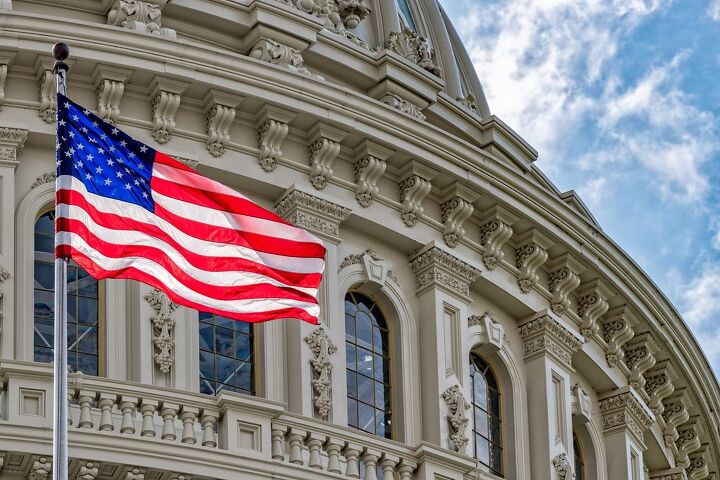Sen. Manchin Proposes Bill to Force Treasury to Finalize EV Tax Credit Guidance

Despite the United States having an entirely new EV tax credit scheme under the so-called Inflation Reduction Act (IRA), there’s nobody adhering to it right now. That’s because the Treasury Department decided to delay issuing specific guidance on battery matters until March, nullifying any restrictions based on content requirements. While this means more automakers have been able to take advantage of government subsidies, it also means they haven’t been required to follow any of the stipulations outlined in the IRA for 2023.
Senator Joe Manchin (D-WV) believes this is unacceptable and has advanced legislation that would effectively force the U.S. Treasury to do its job.
The bill, titled the American Vehicle Security Act of 2023, would amend the Biden administration’s Inflation Reduction Act by making it so that the effective starting date of battery content sourcing requirements is no longer tied to the Treasury Department’s proposed guidance.
Let’s forget, for a moment, that EV tax credits were introduced during the Obama administration as a way to temporarily encourage manufacturers to build more battery-powered vehicles. Let’s also ignore the fact that the early adopters who took advantage of the $7,500 EV tax credits tended to be financially stable households purchasing a second (or third) vehicle. We don’t even need to focus on how the IRA reset the quota system that was designed to make the whole system fairer by ensuring every automaker was eligible for the same amount of money just yet.
The bottom line is that the relevant legislation passed with amendments designed to ensure that battery production and vehicle manufacturing wasn’t centralized in Asia. While some of these concessions weren’t initially embraced by the Biden administration, pressure from hold-out Democrats (like Manchin) resulted in additional eligibility requirements designed to bring manufacturing back to North America while also ensuring six-figure luxury vehicles weren’t being subsidized by American taxpayers. It also decoupled union requirements floated by the White House as an alternative way to boost domestic production. Though, when it finally passed, the IRA was still championed as a major victory for both the Biden administration and the American people in the mainstream media.
However, with the Treasury dragging its feet, the federal government is effectively letting automakers take advantage of these credits indefinitely without restrictions. The department has stated it plans to issue its proposed guidance pertaining to the EV tax credit’s mineral and battery component requirements in March, after having missed its year-end deadline in 2022. It’ll also provide suggestions to further clarify provisions already in effect, including vehicle price cap restrictions.
This will require automakers hoping to take advantage of the credits to adhere to expanding stipulations that battery components stem from North America. An escalating amount of minerals used to create those batteries will also need to come from free-trade partners (or the U.S. itself) with restrictions that no materials originate from “foreign entities of concern.” There are likewise qualifications for vehicles to be assembled in North America and limits set on sticker price and buyer income.
Manchin has already complained about delays with the Treasury's guidance and urged a pause on the consumer and commercial credits, claiming the interpretation of the IRA "bends to the desires of the companies looking for loopholes and is clearly inconsistent with the intent of the law.”
He’s also annoyed that the Treasury has already issued preliminary guidance on leased vehicles, suggesting they should be eligible for clean vehicle credits that don’t come with the same restrictions as the standard EV tax credit. Manchin is insisting the federal government has lost the plot, insisting that the Inflation Reduction Act was supposed to be an energy and security bill designed to encourage domestic manufacturing and decouple supply chains from China – not a giveaway to global automakers.
There’s certainly some truth to that. The Alliance for Automotive Innovation (the largest automotive lobbying group in the world) has stated that no vehicles sold in the U.S. would be eligible for the full credit once the EV battery rules come into effect. This has been echoed by the Internal Revenue Service (IRS), which is on record as saying the number of eligible vehicles would shrink dramatically due to the price, income, and content requirements. Based on the current status of U.S. supply chains and mineral sourcing, this probably wouldn’t change anytime soon either.
But it’s also how the law was written, with Sen. Manchin suggesting his new bill does nothing more than force the government to actually adhere to it.
"It is unacceptable that the U.S. Treasury has failed to issue updated guidance for the 30D electric vehicle tax credits and continues to make the full $7,500 credits available without meeting all of the clear requirements included in the Inflation Reduction Act," he said in a statement issued to Ars Technica.
However, the outlet also framed Manchin as wanting to "stop" EV tax credits – whereas he would undoubtedly see it as holding the government accountable and preventing money from getting to automakers without their adhering to the rules laid out in the IRA. Much of the media coverage surrounding the issue has focused on earlier statements made by Manchin questioning the usefulness of ongoing EV tax credits. There have even been allegations that his additions to the Inflation Reduction Act were actually designed to sabotage the scheme. Of course, had automakers bothered to localize battery production in the U.S. this never would have been an issue to begin with.
“Being an automotive powerhouse is in our blood which is why it is shameful that we rely so heavily on foreign suppliers, particularly China, for the batteries that power our electric vehicles,” said Manchin.
At present, the American Vehicle Security Act has no co-sponsors and has allegedly been getting a substantial amount of pushback from fellow Democrats. The automotive lobby will also come out in full force against it, hoping to buy as much time as it can for sustained EV tax credits with little-to-no restrictions.
There are clearly two sides to this story. But your author would argue that only one of them doesn’t involve giving an unrestricted stream of tax revenue to multinational corporations. But it’s not evident that Manchin will get much support from his own party, or enough Republicans to get the bill to President Biden’s desk. Though, even if it does make it all the way to the White House, the common assumption is that the president would simply issue a veto.
[Image: Andrea Izzotti/Shutterstock]
Become a TTAC insider. Get the latest news, features, TTAC takes, and everything else that gets to the truth about cars first by subscribing to our newsletter.

A staunch consumer advocate tracking industry trends and regulation. Before joining TTAC, Matt spent a decade working for marketing and research firms based in NYC. Clients included several of the world’s largest automakers, global tire brands, and aftermarket part suppliers. Dissatisfied with the corporate world and resentful of having to wear suits everyday, he pivoted to writing about cars. Since then, that man has become an ardent supporter of the right-to-repair movement, been interviewed on the auto industry by national radio broadcasts, driven more rental cars than anyone ever should, participated in amateur rallying events, and received the requisite minimum training as sanctioned by the SCCA. Handy with a wrench, Matt grew up surrounded by Detroit auto workers and managed to get a pizza delivery job before he was legally eligible. He later found himself driving box trucks through Manhattan, guaranteeing future sympathy for actual truckers. He continues to conduct research pertaining to the automotive sector as an independent contractor and has since moved back to his native Michigan, closer to where the cars are born. A contrarian, Matt claims to prefer understeer — stating that front and all-wheel drive vehicles cater best to his driving style.
More by Matt Posky
Latest Car Reviews
Read moreLatest Product Reviews
Read moreRecent Comments
- Kjhkjlhkjhkljh kljhjkhjklhkjh haaaaaaaaaaahahahahahahahaha
- Kjhkjlhkjhkljh kljhjkhjklhkjh *Why would anyone buy this* when the 2025 RamCharger is right around the corner, *faster* with vastly *better mpg* and stupid amounts of torque using a proven engine layout and motivation drive in use since 1920.
- Kjhkjlhkjhkljh kljhjkhjklhkjh I hate this soooooooo much. but the 2025 RAMCHARGER is the CORRECT bridge for people to go electric. I hate dodge (thanks for making me buy 2 replacement 46RH's) .. but the ramcharger's electric drive layout is *vastly* superior to a full electric car in dense populous areas where charging is difficult and where moron luddite science hating trumpers sabotage charges or block them.If Toyota had a tundra in the same config i'd plop 75k cash down today and burn my pos chevy in the dealer parking lot
- Kjhkjlhkjhkljh kljhjkhjklhkjh I own my house 100% paid for at age 52. the answer is still NO.-28k (realistically) would take 8 years to offset my gas truck even with its constant repair bills (thanks chevy)-Still takes too long to charge UNTIL solidsate batteries are a thing and 80% in 15 minutes becomes a reality (for ME anyways, i get others are willing to wait)For the rest of the market, especially people in dense cityscape, apartments dens rentals it just isnt feasible yet IMO.
- ToolGuy I do like the fuel economy of a 6-cylinder engine. 😉


































Comments
Join the conversation
Art Vandelay--I would agree with you except for that 1974 agreement between the US and Saudi Arabia has forced us into a position of being involved in the Middle East. The Saudi's are one of the largest holders of US Treasury bonds currently holding 119 billion as a result. See my comment above and reference to this agreement. Eventually we will be less dependent on oil but how do we get out of that agreement unless we recall all of the Treasury bonds and I doubt we can afford that. I agree with you but I don't know how we can get out of this.
Art Vandelay--Agree with you there. The Chinese will tire of the Saudis and not put up with them for very long. In the long run Saudi oil has come with a hefty price as you said trillions in defense spent in the Middle East. We might have spent a portion in defense of Israel but we made a faustian bargain with the Saudis.